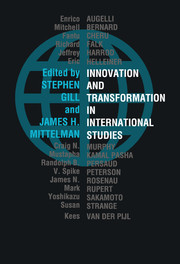Book contents
- Frontmatter
- Contents
- List of contributors
- Preface
- Acknowledgements
- Part I Rethinking and remaking the roots of global social and political theory
- Part II Political economy: the social and ecological anatomy of transformation
- Part III Transformation, innovation and emancipation in global political and civil society
- 9 Globalisation and contested common sense in the United States
- 10 The silent revolution and the weapons of the weak: transformation and innovation from below
- 11 Frantz Fanon, race and world order
- 12 Whose crisis? Early and post-modern masculinism
- Part IV Reflections on global order in the twenty-first century
- References
- Index of names
- Index of subjects
11 - Frantz Fanon, race and world order
Published online by Cambridge University Press: 05 July 2011
- Frontmatter
- Contents
- List of contributors
- Preface
- Acknowledgements
- Part I Rethinking and remaking the roots of global social and political theory
- Part II Political economy: the social and ecological anatomy of transformation
- Part III Transformation, innovation and emancipation in global political and civil society
- 9 Globalisation and contested common sense in the United States
- 10 The silent revolution and the weapons of the weak: transformation and innovation from below
- 11 Frantz Fanon, race and world order
- 12 Whose crisis? Early and post-modern masculinism
- Part IV Reflections on global order in the twenty-first century
- References
- Index of names
- Index of subjects
Summary
This chapter examines the relevance of Frantz Fanon for the study of global politics. While Fanon did not offer a ‘theory’ of international – or as I would prefer, global – relations, I intend to demonstrate that he did point to some of the constitutive antagonisms of global power relations. Of course, whether Fanon may or may not be considered relevant depends on one of the broader concerns of this book, namely, what is the meaning and purpose of theory, and in particular the degree to which critical theory has an emancipatory dimension.
In International Relations realist theorising has served as a form of power/knowledge, thus ‘disciplining’ theoretical practices in the field. By privileging certain conceptions of power, states and national interest, in realist ontology the histories and experiences of less powerful states (and their peoples) become marginal or irrelevant. In other words, the civilisational and political content of realist ontology involves not only what is considered reality, but also how it represents the realities that are included and excluded: it is, in effect, a kind of colonisation and dichotomisation of the mind. This is, in my view, a dangerous error, both theoretically and politically.
One way to illustrate this is with reference to the writings of Fanon, and in particular with his understanding of domination, violence and liberation. Fanon saw colonial domination as both an epistemological and ontological system as well as a form of structural violence that was much broader than economic exploitation.
- Type
- Chapter
- Information
- Innovation and Transformation in International Studies , pp. 170 - 184Publisher: Cambridge University PressPrint publication year: 1997
- 9
- Cited by



